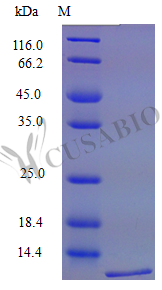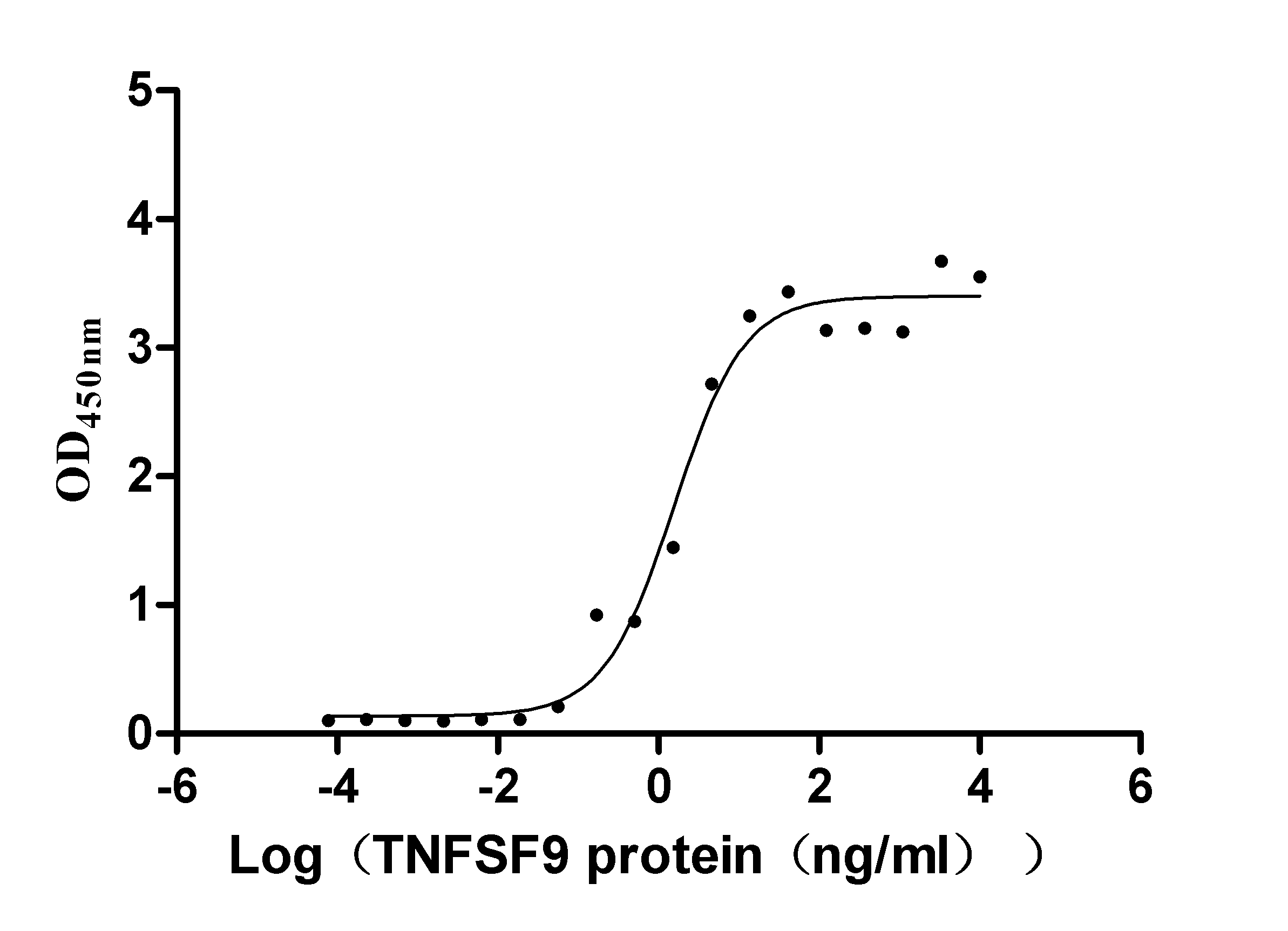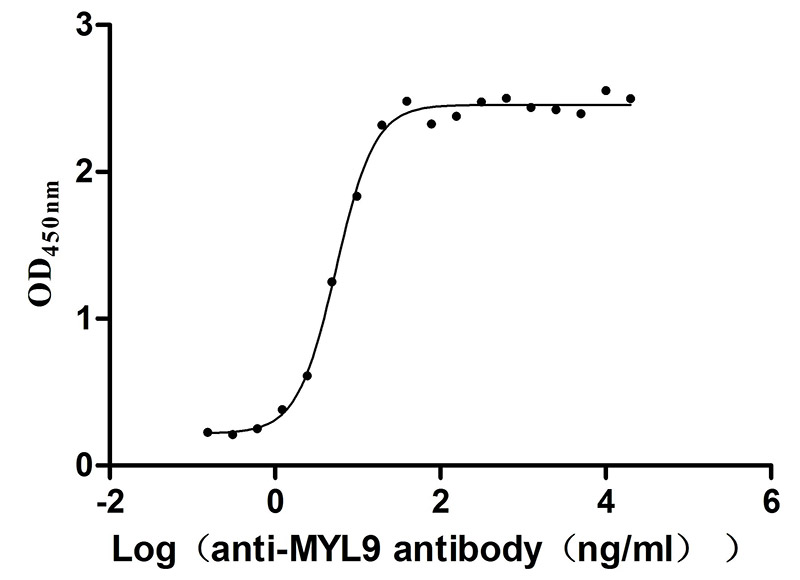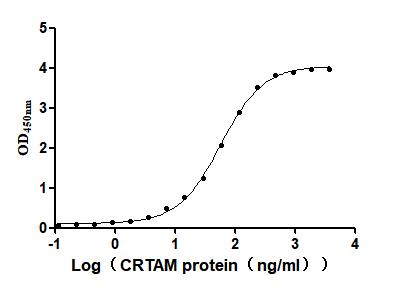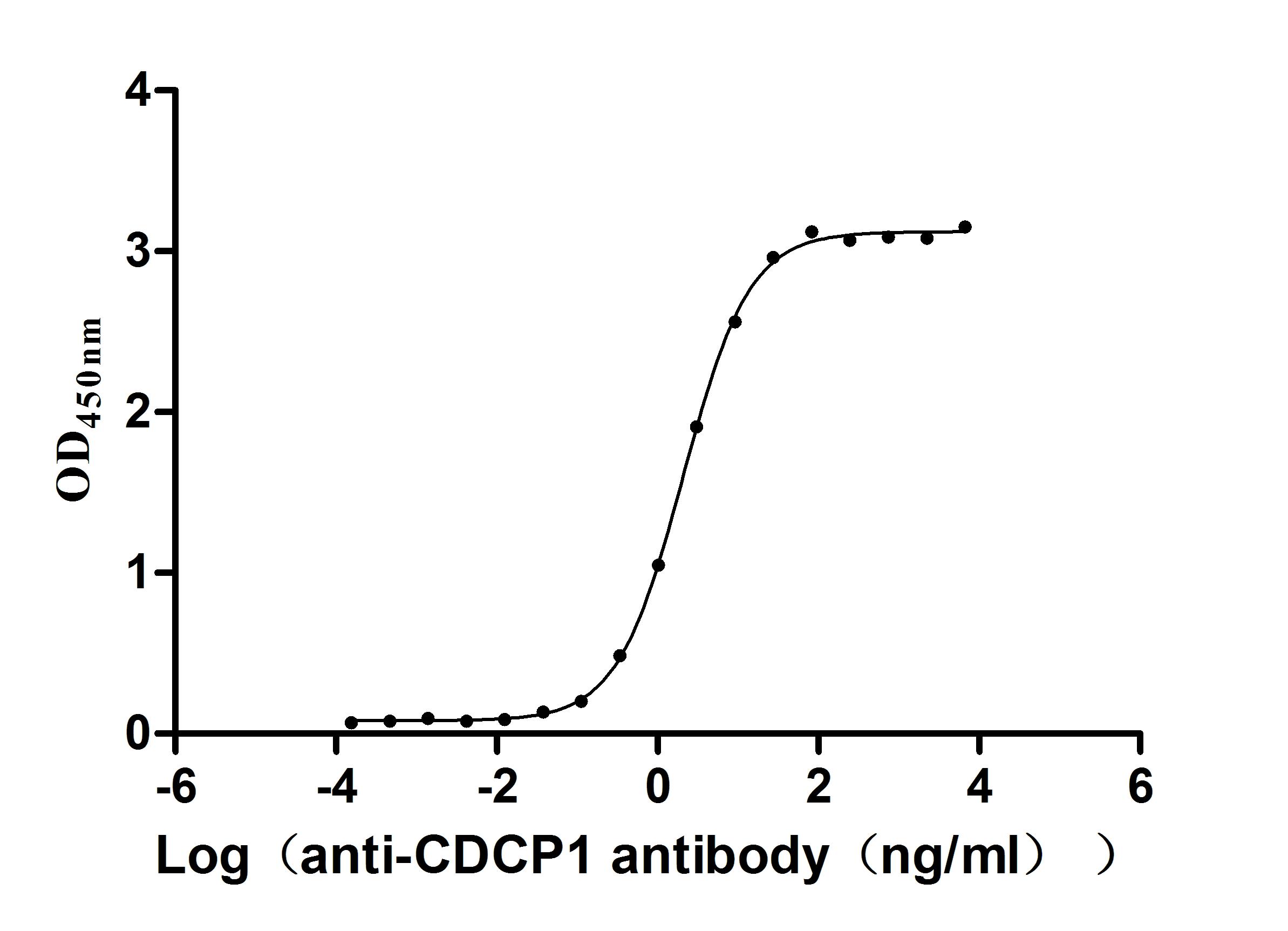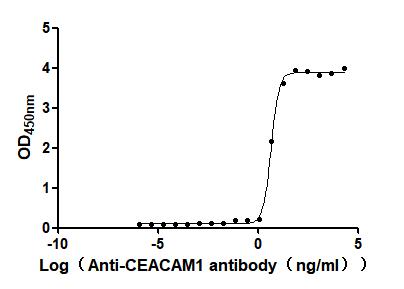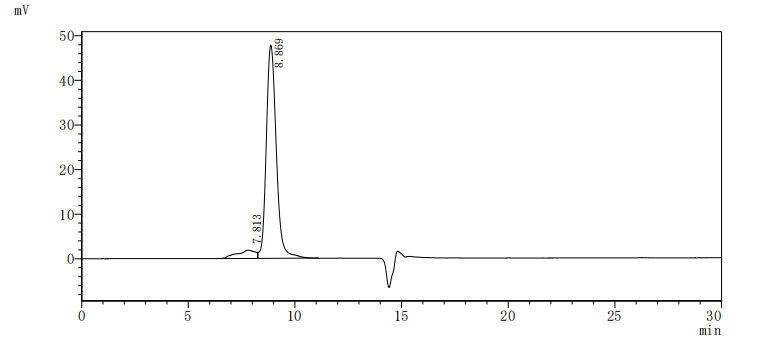Recombinant Mouse C-X-C motif chemokine 16 protein (Cxcl16), partial (Active)
In Stock产品详情
-
纯度:>98% as determined by SDS-PAGE.
-
内毒素:Less than 1.0 EU/μg as determined by LAL method.
-
生物活性:Fully biologically active when compared to standard. The biological activity determined by a chemotaxis bioassay using murine lymphocytes is in a concentration of 20-1000 ng/ml.
-
基因名:
-
Uniprot No.:
-
别名:Cxcl16; SrpsoxC-X-C motif chemokine 16; Scavenger receptor for phosphatidylserine and oxidized low density lipoprotein; SR-PSOX; Small-inducible cytokine B16; Transmembrane chemokine CXCL16
-
种属:Mus musculus (Mouse)
-
蛋白长度:Partial
-
来源:E.Coli
-
分子量:9.9 kDa
-
表达区域:27-114aa
-
氨基酸序列NQGSVAGSCS CDRTISSGTQ IPQGTLDHIR KYLKAFHRCP FFIRFQLQSK SVCGGSQDQW VRELVDCFER KECGTGHGKS FHHQKHLP
-
蛋白标签:Tag-Free
-
产品提供形式:Liquid or Lyophilized powder
Note: We will preferentially ship the format that we have in stock, however, if you have any special requirement for the format, please remark your requirement when placing the order, we will prepare according to your demand. -
缓冲液:0.2 μm filtered PBS, lyophilized
-
储存条件:Store at -20°C/-80°C upon receipt, aliquoting is necessary for mutiple use. Avoid repeated freeze-thaw cycles.
-
保质期:The shelf life is related to many factors, storage state, buffer ingredients, storage temperature and the stability of the protein itself.
Generally, the shelf life of liquid form is 6 months at -20°C/-80°C. The shelf life of lyophilized form is 12 months at -20°C/-80°C. -
货期:5-10 business days
-
Datasheet & COA:Please contact us to get it.
相关产品
靶点详情
-
功能:Induces a strong chemotactic response. Induces calcium mobilization. Binds to CXCR6/Bonzo. Also acts as a scavenger receptor on macrophages, which specifically binds to OxLDL (oxidized low density lipoprotein), suggesting that it may be involved in pathophysiology such as atherogenesis.
-
基因功能参考文献:
- the results of the present study suggested that CXCL16 may regulate the TRL4/NFkappaB/CXCL16 signaling pathway, and that miR146a and miR146b may negatively regulate CXCL16 via this pathway in atherosclerosis in vivo. PMID: 30015963
- Inflammation accelerates renal tubulointerstitial lesions in mouse model of diabetic nephropathy by increasing the activity of CXCL16 pathway. PMID: 29620052
- CXCL16 increases the frequency of the miniature excitatory synaptic currents (mEPSCs) and reduces the PPR of evoked excitatory transmission, indicating that the chemokine also modulates and enhances the release of glutamate. PMID: 27721466
- results indicate that CXCL16 plays a key role in the pathogenesis of renal injury and fibrosis in salt-sensitive hypertension through regulation of bone marrow-derived fibroblast accumulation and macrophage and T cell infiltration. PMID: 27353044
- Data indicate that chemokine C-X-C ligand 16 (CXCL16) is a critical regulator of liver immune response to acetaminophen (APAP)-induced hepatotoxicity, suggesting a potential strategy for the treatment of drug-induced acute liver failure by targeting CXCL16. PMID: 28459937
- CXCL16 plays a crucial role in the pathogenesis of cisplatin-induced acute kidney injury through regulation of apoptosis and inflammation. PMID: 27191747
- These findings suggest that the CXCL16 gene product promotes inflammatory factors and cell infiltration factors, and inhibits the expression of antioxidant factors to accelerate the development of DN, and CXCL16 deficiency attenuates DN may be involved in the AKT signaling pathway. PMID: 28478039
- Results indicate that CXCL16 plays a pivotal role in the pathogenesis of renal artery stenosis-induced renal injury and fibrosis through regulation of bone marrow-derived fibroblast accumulation and macrophage and T-cell infiltration. PMID: 27496882
- Simvastatin exerts a protective effect on renal function and structure in mice with ADR nephropathy which related to the decreasing expression of CXCL16 in glomerular podocytes followed by the decreasing endocytosis of ox-LDL in podocytes and inhibition of NF-kappaB pathway activation. PMID: 26884839
- Serum CXCL16 is increased in severe pancreatitis with infected pancreatic necrosis and identifies patients who benefit from surgical necrosectomy PMID: 25661686
- injured hepatocytes up-regulated CXCL16 expression, indicating that scavenging functions of CXCL16 might be additionally involved in the pathogenesis of NAFLD. PMID: 25372401
- role of IFN-gamma, CXCL16, and ADAM10 in oxLDL-induced lipid accumulation in glomerular podocytes PMID: 24752304
- CXCL16 suppresses liver metastasis of colorectal cancer by promoting TNF-alpha-induced apoptosis by tumor-associated macrophages. PMID: 25495942
- CXCL16 was constitutively expressed by CX3CR1(+) intestinal dendritic cells (DCs) and coexpressed with IL-23 after Citrobacter rodentium infection. PMID: 25456160
- CXCL16 expression inhibits liver metastasis in a murine model of colorectal cancer. PMID: 23242131
- our results indicate that CXCL16 plays a pivotal role in the pathogenesis of angiotensin II-induced renal injury and fibrosis through regulation of macrophage and T cell infiltration and bone marrow-derived fibroblast accumulation. PMID: 24060897
- Renal dendritic cell-derived CXCL16 might attract protective CXCR6(+) iNKT cells. PMID: 23138484
- CXCL16 triggers platelet activation and adhesion via CXCR6 phosphatidylinositide 3-kinase/Akt signaling and paracrine activation, suggesting a decisive role for CXCL16 in linking vascular inflammation and thrombo-occlusive diseases. PMID: 22927331
- Induction of experimental autoimmune encephalomyelitis leads to expression of CXCL10 and CXCL16 in immature myeloid cells of draining lymph nodes, in an interferon (IFN)-gamma-dependent manner. PMID: 22287719
- regulation of CXCL16, ADAM10 and oxLDL expression may be an early event in the onset of diabetic nephropathy PMID: 19426159
- contributes to the pathogenesis of renal fibrosis by recruiting bone marrow-derived fibroblast precursors PMID: 21816936
- Data show that CXCL16 becomes much higher in atherosclerosis, and it could be a potential atherogenic biomarker. PMID: 21177121
- This study implicates CXCL16 as an additional neutrophil chemoattractant in cerebrospinal fluid in early pneumococcal meningitis. PMID: 20874518
- An alternatively spliced CXCL16 isoform expressed by dendritic cells is a secreted chemoattractant for CXCR6+ cells. PMID: 20181724
- Overall, our data indicate that up-regulation of CXCL16 is a common response of tumor cells to radiation, and they have important implications for the use of local radiotherapy in combination with immunotherapy. PMID: 20334513
- CXCL16 expression is a critical mediator of muscle regeneration PMID: 19893053
- SR-PSOX/CXCL16 may be involved in CD8+ T cell recruitment through VLA-4 activation and stimulation of IFN-[gamma] production by CD8+ T cells during inflammatory valvular heart disease. PMID: 14699018
- SR-PSOX/CXCL16 plays important roles in EAE by supporting generation of Ag-specific T cells, as well as recruitment of inflammatory mononuclear cells into the CNS. PMID: 15265890
- increased IFN-gamma, accompanied by elevation of the scavenger receptor/chemokine CXCL16, was observed in both lesions and spleens after IL18 administration PMID: 15604417
- CXCL16, the cell surface ligand for CXCR6, is expressed on sinusoidal endothelial cells, and CXCR6 deficiency resulted in reduced survival in liver natural killer cells. PMID: 15799695
- Transmembrane chemokine CXCL16 is expressed in the brain by malignant and inflamed astroglial cells, shed to a soluble form and targets not only activated T cells but also glial cells themselves. PMID: 15934948
- CXCL16 plays a unique role in the maintenance of cardiac allograft tolerance mediated by natural killer T cells. PMID: 16081769
- CXCL16 is involved in immunological liver injury by regulating T lymphocyte infiltration in liver tissue PMID: 16124049
- findings suggest that CXCL16 is an important mediator of lymphocyte-stromal interaction within lymphoid tissues PMID: 16410312
- These data suggest that scavenger receptor activity mediated by CXCL16 in vivo is atheroprotective. PMID: 16880330
- These results demonstrate a role for CXCL16 in the control of bacterial colonization of target organs and, more specifically, in the regulation of the cell-mediated arm of the primary response to S. enteritidis. PMID: 16982830
- CXCL16 is constitutively expressed on the surface of epidermal keratinocytes, released upon cell activation or photodamage and may then target CXCR6-expressing T cells in the dermis PMID: 17363916
- SR-PSOX/CXCL16 plays an important role in not only the production of IFN-gamma by NKT cells, but also promotion of Th1-inclined immune responses mediated by NKT cells. PMID: 18056360
- Hyperhomocysteinemia up-regulates CXCL16 leading to increased recruitment of CXCR6(+) lymphocytes and scavenging of modified lipids via a potential involvement of a PPAR-gamma-dependent mechanism PMID: 18194461
- Data show that the chemokine receptor CXCR6 is highly expressed on glial precursor cells (GPCs) and is induced by its ligand, and that GPCs proliferate and migrate to the sites of CXCL16 production. PMID: 18619850
- Ionizing radiation markedly enhanced the secretion by mouse and human breast cancer cells of CXCL16; irradiation increased the migration of CD8(+)CXCR6(+) activated T cells to tumors PMID: 18713980
- Report increased production of CXCL16 in experimental heart failure: a possible role in extracellular matrix remodeling. PMID: 19919988
显示更多
收起更多
-
亚细胞定位:Membrane; Single-pass type I membrane protein.
-
蛋白家族:Intercrine alpha (chemokine CxC) family
-
组织特异性:Widely expressed. Not detected in purified B- and T-cells.
-
数据库链接:
KEGG: mmu:66102
STRING: 10090.ENSMUSP00000019064
UniGene: Mm.425692
Most popular with customers
-
Recombinant Human Tumor necrosis factor receptor superfamily member 9 (TNFRSF9), partial (Active)
Express system: Mammalian cell
Species: Homo sapiens (Human)
-
Recombinant Human Myosin regulatory light polypeptide 9 (MYL9) (Active)
Express system: Yeast
Species: Homo sapiens (Human)
-
Recombinant Mouse Cytotoxic and regulatory T-cell molecule (Crtam), partial (Active)
Express system: Mammalian cell
Species: Mus musculus (Mouse)
-
Recombinant Macaca fascicularis CUB domain containing protein 1 (CDCP1), partial (Active)
Express system: Mammalian cell
Species: Macaca fascicularis (Crab-eating macaque) (Cynomolgus monkey)
-
Express system: Mammalian cell
Species: Homo sapiens (Human)
-
Recombinant Human Tyrosine-protein kinase receptor UFO (AXL), partial
Express system: Mammalian cell
Species: Homo sapiens (Human)

